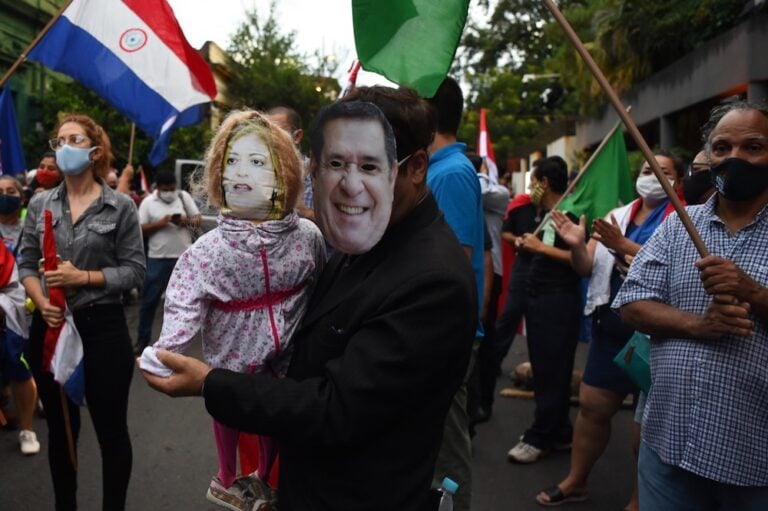(CPJ/IFEX) – The following is a 28 September 2004 CPJ press release: PARAGUAY: Inter-American Court condemns criminal defamation conviction New York, September 28, 2004 – In a decision with broad implications for press freedom in Latin America, the Inter-American Court of Human Rights has ruled that a criminal defamation conviction in Paraguay violated international law. […]
(CPJ/IFEX) – The following is a 28 September 2004 CPJ press release:
PARAGUAY: Inter-American Court condemns criminal defamation conviction
New York, September 28, 2004 – In a decision with broad implications for press freedom in Latin America, the Inter-American Court of Human Rights has ruled that a criminal defamation conviction in Paraguay violated international law. The court, in a decision handed down this month, found that the criminal proceedings themselves violated the American Convention on Human Rights because they were an “excessive limitation in a democratic society.”
The court is an arm of the Organization of American States (OAS) and its decisions are binding on member nations. The ruling, coupled with an August decision overturning a criminal defamation conviction in Costa Rica, seems to signal a broad shift against criminal defamation laws in Latin America.
The Paraguayan case dates to August 1992, when presidential candidate Ricardo Canese questioned rival Juan Carlos Wasmosy about ties to former dictator Alfredo Stroessner. In statements to the local press, Canese said that Wasmosy, who went on to become president, was Stroessner’s front man in a construction partnership known as CONEMPA. The partnership had been awarded a contract to build the giant Itaipú hydroelectric power plant on the Paraguay-Brazil border.
In October 1992, CONEMPA business partners whom Canese had not named in his statements filed complaints alleging libel and defamation. In March 1994, a judge sentenced Canese to four months in prison and ordered him to pay a US$7,500 fine. An appeals court rejected Canese’s appeal in November 1997, though it reduced his sentence to two months in prison and a US$600 fine. The Supreme Court dismissed an initial appeal, and Canese took the case to the Inter-American Commission on Human Rights. The commission is the human rights monitoring arm of the OAS.
In June 2002, the commission asked the Inter-American Court to declare that Paraguay violated Canese’s right to freedom of thought and expression, as well as other rights guaranteed by the American Convention on Human Rights. Paraguay’s Supreme Court, fearing a ruling against the country, dismissed the case against Canese in late 2002, but the Inter-American Court continued with its proceedings.
The Inter-American Court, in a decision made public September 14, ruled that both the conviction and prosecution itself violated Article 13 of the American Convention on Human Rights, which guarantees freedom of expression. The Inter-American Court, which is charged with interpreting the American Convention, also ordered Paraguay to pay Canese US$35,000 in damages.
The court found that the criminal proceedings and sentence “constituted an unnecessary and excessive sanction for statements made in the context of the electoral campaign, in reference to another candidate for the presidency and matters of public interest.” Such sanctions, the court said, “limited an open debate on issues of interest or public concern.”
The Committee to Protect Journalists, which has helped fight criminal defamation laws in Latin America, hailed the court ruling.
“This is a major step forward for freedom of expression and the campaign to decriminalize defamation from the Americas that could have broad implications throughout the world,” CPJ Executive Director Ann Cooper said. “The legal logic of this decision requires that governments in Latin America refrain from prosecuting journalists on defamation charges and reform their defamation laws to eliminate criminal penalties.”
The Canese decision built on an August ruling in a case involving the Costa Rican newspaper, La Nación. In that case, the court overturned the criminal defamation conviction of reporter Mauricio Herrera Ulloa, and ordered the Costa Rican government to compensate him. In a concurring opinion, Judge Sergio García Ramírez, president of the Court, questioned the basic idea of criminalizing defamation and suggested that such laws should be repealed.
On September 10, Eduardo Bertoni, OAS special rapporteur for freedom of expression, convened a meeting at CPJ offices to discuss the Herrera Ulloa ruling. A declaration ratified by the free press and legal advocates asserted: “Criminal defamation is a disproportionate and unnecessary response to the need to protect reputations [and] . . . civil defamation laws provide sufficient redress for all those who claim to have been defamed.”
To read the full declaration click here: http://www.cpj.org/news/2004/ParaguayDefam28sept04.html
For more information about press freedom conditions in Paraguay, visit http://www.cpj.org. CPJ is a New York-based, independent, nonprofit organization that works to safeguard press freedom around the world.


